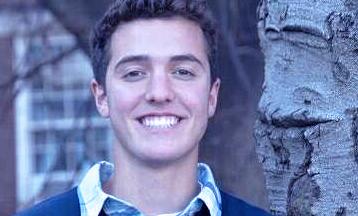-
About
First-Year Application Deadlines
Don't miss your chance to apply to Marist!
• Early Decision I and Early Action: Friday, Nov. 15
• Early Decision II and Regular Decision: Saturday, Feb. 15About
-
Academics
First-Year Application Deadlines
Don't miss your chance to apply to Marist!
• Early Decision I and Early Action: Friday, Nov. 15
• Early Decision II and Regular Decision: Saturday, Feb. 15Academics
-
Admission & Financial Aid
First-Year Application Deadlines
Don't miss your chance to apply to Marist!
• Early Decision I and Early Action: Friday, Nov. 15
• Early Decision II and Regular Decision: Saturday, Feb. 15Admission & Financial Aid
-
Student Life
First-Year Application Deadlines
Don't miss your chance to apply to Marist!
• Early Decision I and Early Action: Friday, Nov. 15
• Early Decision II and Regular Decision: Saturday, Feb. 15Student Life
- Athletics
Students talking to each other in front of posters

James Johnson
Poughkeepsie, NYAcademic School
Liberal ArtsCampus
New YorkDr. James M. Johnson has followed his career from the United States Military Academy to West Point to the Naval War College. Now, he brings this experience in leadership and education to his position as the Executive Director of the Hudson River Valley Institute (HRVI) and as a Marist professor in the School of Liberal Arts.
Describe your role with the Hudson River Valley Institute (HRVI).
I supervise the day-to-day plans and operations of HRVI, which is the academic arm of the Hudson River Valley National Heritage Area. Its mission is to study and to promote the Hudson River Valley and to provide educational resources for heritage tourists, scholars, elementary school educators, environmental organizations, the business community, and the general public. Its many projects include the publication of the Hudson River Valley Review and the management of a dynamic digital library and leading regional portal site. I am also the Dr. Frank T. Bumpus Chair in Hudson River Valley History.
Why are you interested in the Hudson River Valley?
I spent eighteen years at the United States Military Academy as a cadet and an instructor; my wife Lois and I have lived in Orange County for nineteen years. While I grew up in Georgia, the HRV is now my home. As a captain/instructor in the Department of History at West Point from 1977-80, I started studying Fortress West Point in the American Revolution and led tours. In graduate school at Duke University, I had done research for my MA thesis and Ph.D. on colonial and Revolutionary-era Georgia so the transition was natural.
What was your experience like studying the military at the beginning of your education?
When I was a cadet at West Point, I studied American and European military history for two semesters. This piqued my interest. The Head of the West Point History Department invited me to attend graduate school and then join his department for a three-year tour of duty. I studied military history at Duke and then taught it at West Point.
How do you bring your past experiences like that into your current position?
My students generally call me "the colonel" so I try to include my own experience as I teach my course on US Military History. I have been teaching at the collegiate level at West Point, the Naval War College, and Marist for thirty-three years so I can lead by example as I inspire students to be good citizens and leaders.
What is your favorite thing about working at Marist?
Seeing the Hudson River every day and inspiring students to value where they live for four years.
How can you be an asset to Marist students?
I offer my experience as a leader and teacher. I serve as an unofficial liaison for ROTC cadets as they prepare to be Army officers.
What is one thing most students don't know about you?
I live in a stone farmhouse in Blooming Grove built during the American Revolution, so I breathe "revolutionary" air every morning.
Written by Sarah Gabrielli '18



